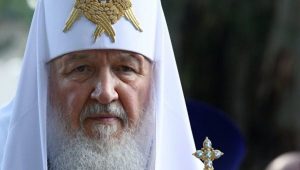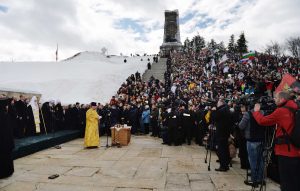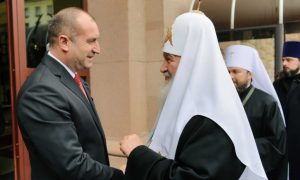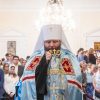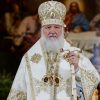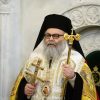In the Name of the Father, and of the Son, and of the Holy Spirit!
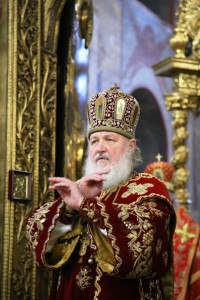
The entire week of Pascha is dedicated to a single vitally important theme: that of belief and unbelief. At the evening service on the first day of Pascha we read the Gospel about how the Lord appeared to the disciples, but Thomas was not present. Thomas said he would not believe in the Resurrection until he had touched the Savior with his own hands and put his fingers into the nail wounds. Next Sunday will continues this theme, when we read the next part of the Gospel, which relates how the Lord appeared to the disciples, how Thomas was among them, and how he put his finger into the wounds of the nails, acknowledged the Resurrection, and worshipped the Risen Savior.
Today we have just heard two episodes from the Gospel. Peter went to the tomb, saw the linen clothes lying by themselves, and went away wondering at that which had come to pass. But why, it would seem, did he wonder? After all, the Savior had repeatedly said that He would have to suffer and rise again. So he should have rejoiced and not wondered. It was all so simple! The empty tomb, the grave clothes lying there – that means the Resurrection had taken place. Peter does not believe; he cannot understand what happened. Two others, Luke and Cleopas, who were going to Emmaus, tell their companion about what had taken place. The Savior, Who was in fact their companion, but Whom Luke and Cleopas did not recognize – for, as the Gospel says, their eyes were holden – says to them: Was it not necessary that Christ should suffer these things? Indeed, Luke and Cleopas had surely heard what the Savior, when He was still alive, had said about His suffering, death, and resurrection.
Why does the Church introduce the theme of belief and unbelief in this most important week of the year, the first week after Pascha? It is so that we would all give thought to what belief and unbelief are, because this is the central theme of human life. Even unbelieving Marxist philosophers acknowledged that the foundational question of philosophy is that of God. Which comes first: spirit or matter? It is impossible to relate to this question in any other way, because all human civilization develops around this central question. People’s lives depend on their response to this question – and not only in the age to come, but here on earth. The future of human relations, human societies, and the meaning of life in general depend on this question, because it is only by responding to this question that people are somehow able to establish relations with one another and with the surrounding world.
The Apostle Paul tells us what faith is: faith is the substance of things hoped for, the evidence of things not seen (Hebrews 11:1). St. Philaret (Drozdov), explaining this text of the Apostle Paul in his Catechism, uses a remarkable phrase that is well-known to every seminarian: faith is “trust in the unseen as though it were seen, in that which is hoped and waited for as if it were present.” Faith is the awareness of the presence of Divine reality in our life without any evidence. If there is evidence, then there is no faith, but there is knowledge. Thomas did not believe: he simply felt the Savior’s body, putting his fingers into His wounds. This was not faith, this was knowledge, which is why the Lord says: Blessed are they that have not seen, and yet have believed. Indeed, faith is a perfectly special human condition. It extends to all the powers of human nature. That same Metropolitan Philaret (Drozdov) speaks in remarkable terms of how faith starts in reason, although it belongs to the heart. But it does not belong only to the heart, nor only to the realm of our feelings, nor only to our reason. It also belongs to our will because, as the Apostle says, faith without works is dead (James 2:26). But for faith to be living, our will must be seized by faith, so that our actions would be dictated by our convictions and faith. Thus, man’s reason, heart, and will are all located in the same realm of being as faith, for it extends to all of human nature – just as unfaith does. Therefore people are divided into believers and unbelievers. All other human divisions are matters of convention. Sometimes people tell us: there are many political parties, many choices, and many behavioral models. They have even devised a term: pluralistic society, in which there are various behavioral patterns and worldviews. If you were to clean up all these behavioral models and give them a good wipe with a cloth, only two would remain: one defined by belief and one defined by unbelief. Faith starts in reason – St. Philaret was right. Faith appears in thoughts. Therefore, the realm of reason is the battlefield between belief and unbelief. This is an intellectual struggle. It requires much knowledge and a good education, because knowledge and education are often employed to assert a non-religious way of life.
Until quite recently, the word “science” was necessarily bound up with atheistic convictions. It was simply taken for granted, as something self-evident, that the religious view of the world was false and the scientific view of the world was true. I shall never forget my first speech in our country’s government. This was in that distant year of 1990, when the Soviet Union still existed. I was invited to a meeting of the government, where they were considering some relaxation of governmental policy with regards to the Church. It was the new period of perestroika and glasnost, so they decided to invite a representative of the Church to ask him what he thought of the new law regulating Church-State relations. I remember well the hall in which we sat and the generally well-intentioned people who were prepared both to listen and to speak. I related a few things and shared thoughts that, it seemed to me, were well received by all.
But then I spoke about the most important thing: that real freedom of belief presupposes the opportunity for people to obtain knowledge about faith, including in schools. Then one well-intentioned man, with whom I am still on good terms, looked at me with sincere astonishment. He said: “But, Vladyka, how can knowledge of religion possibly be taught in school? After all, schools should inculcate a scientific view of the world in people.” I realized that it would take a long time for people to understand that there is no contradiction between religious and scientific views of the world, just as there is no contradiction between math and music, just as there is no contradiction between poetry and chemistry, because each of these sciences and fields of human activity describes and studies different aspects of being. You cannot deny God on the basis of scientific knowledge, just as you cannot deny scientific achievements on the basis of religious knowledge.
For reason to find faith, reason must do an enormous amount of work. No one can ever say: I have finished this work, everything is clear to me. The thinking person constantly puts questions to himself; the believing person should constantly cultivate his mind, educating his mind in faith. Not only, in the words of the Apostle, to give an answer to everyone who asks, but also to strengthen himself in faith. Such strengthening of faith allows faith to cease remaining only in the sphere of reason and to become a power that seizes man’s entire being. When faith begins to live in the heart, one begins to feel God’s presence. God no longer appears to man in logical constructs, in intellectual proofs, but in the real experience of life, when the believer feels God’s presence in prayer, when he partakes of the Holy Mysteries of Christ, when this presence of the Lord in his life is so strong that he sees this presence. He knows exactly what in his life is from God and wherein lies God’s gift. He can state precisely: this happened to me by God’s mercy, by God’s will, this is God’s presence in my life. Then faith becomes so strong that the will is strengthened and you want to live in accordance with this faith, to do good deeds, to share your experience with others. How important it is that the pastoral vocation of our seminarians and monks be based on this living and real experience of the presence of God in their lives! Then the need to serve and preach will be an organic one; then the voices of such people will never fall silent, because they wish to share their experience with their neighbors.
But there are, after all, other examples in our church circles: when we become so accustomed to this state of affairs that we stop reflecting and thinking about God and have no questions, since we often do not know what is going on in the world. We do not know the problems that people face and what challenges to the faith exist in our times. Not knowing these challenges, we do not even attempt to respond to them. The work of thought disappears. But St. Philaret was right: faith starts in reason. If we take the logic of his words further, then perhaps faith also stops in reason? If reason stops working, if the subject of faith ceases to be dominant in our inner lives, then how can we keep faith in our hearts? After all, it can leave our hearts. Outwardly all will be well: we go to church, we even celebrate the divine services, we perform all the rites – but there is no faith. It seems to be there, but it is already gone. There is no bond with the Lord; it has been lost. We pray and read our prayer rule out of inertia, but we do not sense the real presence of God in our lives. We become as sounding brass or a tinkling cymbal [1 Corinthians 13:1].
What of those people who do not believe in God at all? Did the Lord condemn Peter for coming to the tomb and not immediately confessing his faith in the Resurrection? No. Although He mildly rebuked Luke and Cleopas, He likely could have punished them severely. Unbelief has always existed in human history, throughout its entire course. But the atheist of yesterday can become an ardent believer. Perhaps the fact that many do not come to belief from unbelief can be explained by our weak faith, by our inability to share our experience of faith with others. Imagine that we encounter some unbelievers. Can we, by our words and life, kindle the flame of faith in them? Some can do this, but the majority cannot. This is why, when we think about unbelievers, we should not judge them, but should rather pray for them, for our unbelieving husband or wife, for our unbelieving children or parents, and do our utmost so that our experience of faith would becomes familiar and understandable to them and to millions of others.
We, as the Church, should be a thinking community. Thought should always be pulsing in the Church. What a remarkable example the Holy Fathers give us, who were constantly thinking about their faith, reading a great deal, and working! If we live in a sort of spiritual sloth, oblivious, in petrified insensitivity, then we will easily lose faith, even if we are vested in holy garments. This is why we should be a thinking community. But the main thing is that we should be a praying community, because it is in prayer that we have the real experience of communion with God. Prayer should not be formal, it should drain our minds, it should not overburden us – nor, conversely, should it turn us away from God, as can sometimes happen. In prayer there should always be the ardent desire to hear the will of God, to hear His response, to feel His presence, to be able to distinguish the signs of His presence in our lives. Then we will not feel the need to demand miracles of the Lord, as contemporary people often do: give us a miracle without fail, and we will believe. But we will not believe! The ancient inhabitants of Jerusalem did not believe in the Savior’s Resurrection, even though he had raised Lazarus the four-day-dead rose from the dead nearly in front of their eyes. They did not believe in the Resurrection when the dead arose, the sick were healed, and the hungry were fed – they did not believe. An outward miracle is incapable of turning someone into a believer without a great amount of work on himself. This is why a believer’s life is always a substantive one.
One needs to think, to reflect on one’s faith, to read a great deal, not to talk about trifles when meeting with one another, not to pick one other to pieces, but to talk about one’s faith. Why not ask one other about how you understand various words of the Gospel? Or about how you understand various words in the Epistles? After the Liturgy, ask: what do you think the Lord wanted to tell us in the Gospel reading? Share such knowledge with one another. How wonderful it would be in our monasteries if the brethren reflected together on the Word of God and Patristic texts, constantly exerting their reason and growing in faith!
If the rich spiritual experience of prayer and good deeds can be added thereto, then they will believe, then we will need to talk about how every Christian should be a candlestick on high so that their light can be seen by others. It is not by chance that the Church proposes that we reflect on belief and unbelief at this most important time of the year, immediately after the Resurrection, as if implicitly indicating to us that we, too, are often among those who did not believe in the Savior’s Resurrection immediately after it occurred. In order to grow in faith, we must recognize our weakness and sinfulness and say in the words of the Gospel: Lord, I believe, help thou mine unbelief! [Mark 9:24]. Amen.
Delivered on Bright Tuesday, April 21, 2009, at the Trinity-Sergius Lavra.
Translated from the Russian.












